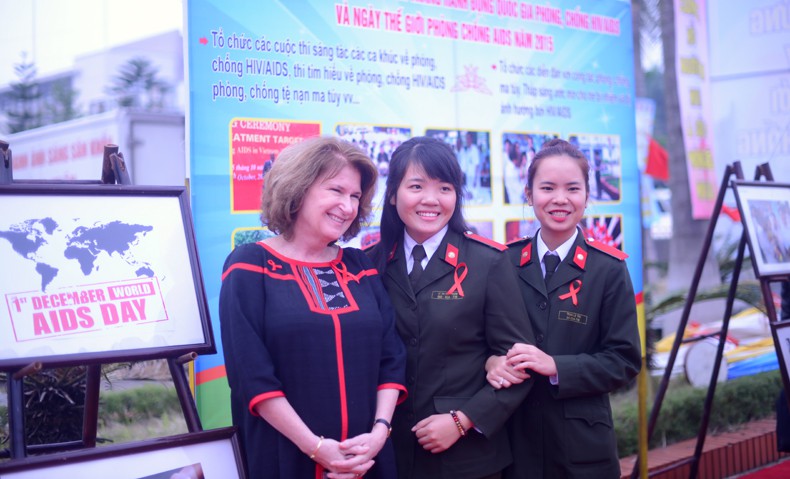Opening Hearts, Ending Stigma and Discrimination
Have you or your family ever faced discrimination? I was really moved when I heard the story of Pham Thi Oanh and Phuc, her ten-year-old son, who are both living with HIV. Fearing that her son would be rejected in his own community, Oanh sent Phuc to kindergarten in a neighbouring commune. One day, one of Phuc’s classmates revealed his HIV status, and the teacher, in consultation with commune authorities, immediately sent him home. Just imagine how Phuc and his mother must have felt!
Unfortunately, this story is not unusual, in Viet Nam and in the rest of the world. I am deeply concerned about the well-being of people living with HIV, and people who are at risk of HIV. Many live in constant fear of stigma and discrimination.
More than twenty years into the HIV response, HIV still remains one of Viet Nam’s most significant public health challenges. The country is also still facing challenges related to social attitudes toward people living with HIV. Stigma and discrimination continue to prevent highly vulnerable people from fulfilling their basic rights to health and social security, and blocks the progress of HIV prevention and control efforts.
There is a body of rich and recent evidence indicating that people living with HIV are often rejected and isolated by their own families, communities and social networks. This data also shows that being HIV positive can lead to loss of jobs, loss of property, and exclusion from school. People living with HIV can experience violence, they are sometimes denied medical and social services, and they find it difficult to access legal aid.
Stigma and discrimination not only affects individuals, it also helps fuel the silent spread of HIV among communities. People living with HIV who fear harsh attitudes or unfair treatment are far less likely to get tested and to adopt preventive behaviours. Being afraid to be tested for HIV can mean that they unknowingly pass infection on to their loved ones or other people in the community. For example, a husband may pass HIV on to his wife, who may then pass it on to her unborn child. So where there was originally only one infection, there are now three. And this happens because people are too afraid to be tested for HIV, and because they fear how they might be treated if they test positive.
Even if people know their HIV status, the continuing presence of stigma and discrimination in health facilities, in schools, and in the community means that they will be less likely to disclose their HIV status to their husbands or wives, or to their families and close friends. They will also be more likely to postpone or even reject vital care and treatment.
I have heard stories of people travelling far from their own communities to seek care from health service providers that they do not know, simply to prevent people in their own communities from knowing about their HIV status. They fear breaches of confidentiality in their local health facilities. Many seek treatment only when they can no longer hide their symptoms, and are very sick. This means it will cost far more for their treatment, and they risk losing the preventive benefits of early treatment.
So, in light of the stigma and discrimination against them, what has happened to Oanh and Phuc? Oanh repeatedly met with the education authorities at both the commune and district levels and made every effort, including seeking legal aid, to get her son into the local primary school. I’m delighted to share that, as a result of her courage and persistence, this year Phuc finally entered grade 1. Even though he is studying alongside much younger classmates, his mother says that he is happy and learning many new things at school. But she points out that nearly fifty children living with HIV in her province are still unable to go to school because of stigma and discrimination related to HIV. And the people of that province aren’t alone: the situation is the same in several other provinces.
I am very inspired by the victory of this courageous mother living with HIV in getting her son back into school. However, eliminating the stigma and discrimination associated with HIV and AIDS is still an uphill task, here in Viet Nam and throughout the world, and it is one challenge that we cannot afford to shy away from.
As we commemorate World AIDS Day this year, we will, as always, remember all those many thousands of people who have lost their personal battles with AIDS. But this year, let us also make a new collective commitment to ending the stigma and discrimination associated with HIV. Let us join hands together to show our support to people living with HIV and to those who are at higher risk of infection. Let this World AIDS Day mark the beginning of a new age, in which stigma and discrimination against the most vulnerable is a thing of the past, and in which our hearts are opened with compassion toward those who are most vulnerable. Together we can eliminate stigma and discrimination; together we will end AIDS!
Kristan Schoultz
Country Director, UNAIDS Viet Nam
Convener of the Joint UN Team on HIV in Viet Nam




